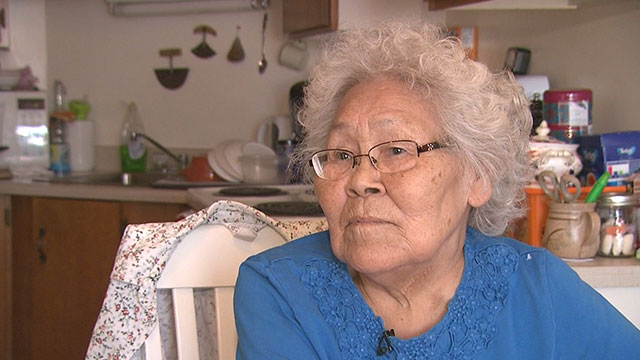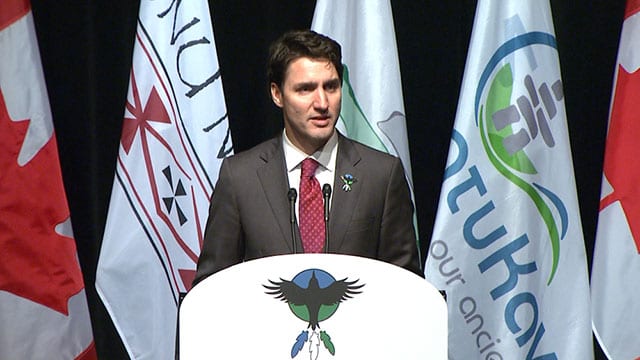APTN News
Leah Ford recalls the abuse she endured as a seven- and eight-year-old student at a residential school in Makkovik, Labrador run by the Moravian Church.
Older students in the girls’ dorm made her steal food and cigarettes from a teacher’s room. When she was caught she “got a beating on my bum,” she says. Other times Ford was whipped with a tree branch.
If she refused to steal, “I would have got beat up anyway,” the 80-year-old survivor explains, seated at the kitchen table of her apartment in a senior’s complex in Happy Valley-Goose Bay.
“It wasn’t only me. There was other girls.”

Ford is one of an untold number of residential school survivors from Newfoundland and Labrador who have waited decades for an acknowledgement of their suffering, an apology, and perhaps for other acts of recognition to help them on their healing journeys from the suffering they endured at the hands of colonial governments and institutions who abused and attempted to assimilate them.
When Prime Minister Justin Trudeau apologized to residential school survivors in Labrador last November, Ford was not in the crowd. She was home, a few blocks away.
She was excluded from the class action settlement that compensated many of her fellow survivors, and was not an intended recipient of Trudeau’s apology on behalf of Canada.
“I was really disappointed, but I won’t cry about it,” she says, recalling the day Trudeau came to town. “They can keep their money.”
The Labrador apology contributed to a national narrative that justice was being served to residential school survivors in Canada.
But Ry Moran, director of the National Centre for Truth and Reconciliation in Winnipeg, says the Truth and Reconciliation Commission heard from thousands of survivors whose suffering has not officially been acknowledged by the state.
“On one side of things we can celebrate the fact that there was an apology, and there was a recognition of the harms done. At the same time we have to recognize that we have got so many more apologies that we need to make in this country,” he says.
“It is very unfortunate where we are seeing people being left out. And I can only imagine how hurtful that would be.”
Former Prime Minister Stephen Harper’s Indian Residential School Settlement and apology in 2008 excluded survivors from Newfoundland and Labrador because, the government argued at the time, the province was not part of Canada when the schools were established.
A subsequent settlement by the Trudeau government established criteria according to which survivors from Newfoundland and Labrador would be compensated.
Those who attended prior to the province joining Confederation in 1949, and those who attended only during the day and did not stay in the dorms, were not part of the settlement.
On Nov. 23, the day before Trudeau’s apology, Premier Dwight Ball announced the province, too, would apologize to survivors.
Following Trudeau’s apology in Happy Valley-Goose Bay, Ball told APTN he did not yet know if the government would be apologizing to survivors who attended when Newfoundland was still a British dominion, or to those who attended the schools by day.

On Friday, Ball’s office sent APTN a statement saying the government is still in consultations with five Indigenous governments and organizations “regarding the delivery of the apology,” and that [g]iven the sensitive nature of the subject matter and the consultations, we will not comment on the details of the apology until all consultations are finished.”
Retired Inuk judge James Igloliorte was commissioned by the federal government to lead the healing and commemoration part of Canada’s settlement with Newfoundland and Labrador survivors.
At a recent community feast for survivors in Happy Valley-Goose Bay, he told APTN he’s not aware of how many survivors were excluded from the federal settlement and apology, but that he assumes the pre-1949 survivors “are not large numbers.”
In an interview with APTN last November, Igloliorte said during the consultation process with survivors in Labrador he heard from a number of people who felt a federal apology was “hollow…because only one of four parties is actually speaking.”
After seeing that interview on APTN National News, International Grenfell Association [IGA] Chair Keating Hagmann said the IGA board decided to apologize for the institution’s role in the survivors’ suffering.
“The IGA offers its sincere apology for in any way not sheltering these individuals from the suffering they endured,” the statement reads.
“In the spirit of reconciliation, IGA looks forward to walking into the future with all peoples of Newfoundland and Labrador.”
The IGA operated schools in St. Anthony, Cartwright and North West River and still has an active charitable presence in Labrador.
The Moravian Church, which operated schools in Nain and Makkovik and has a long and intricate history with the Inuit of northern Labrador, has not apologized for its role.
APTN reached out to Moravian Church representatives in Labrador, the United States and the U.K. No one willing to do an interview responded to the requests.
As the federal healing and commemoration process continues for the nearly 1,000 residential school survivors from Newfoundland and Labrador, untold others await a decision by the provincial government on whether it will apologize and take responsibility for the abuse and assimilation perpetrated against them in their youth.
“When we’re excluding people that’s kind of recreating some of the hurt,” says Moran, “and it can be a real barrier to actual longterm reconciliation.”










